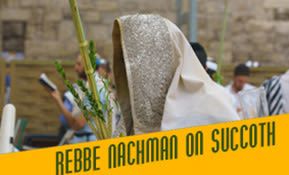
I Will Sing! (Azamra)
"I will sing! (Azamra)" It goes on to explain that from all the good points that a man collects, a melody will be composed that will allow him to sing...

“I will sing! (Azamra)” It goes on to explain that from all the good points that a man collects, a melody will be composed that will allow him to sing and be joyous.
“Judge every man positively, even if he is totally wicked. Find something good in him, a mitzvah or a good deed… He cannot have gone through life without having performed at least one good deed” (Likutey Moharan I:282).
The essence of repentance, the path of return to God, consists of awakening the good latent in us. This explains the importance of contemplating only the righteous aspect when passing judgment on someone and this is the best way to allow him to correct his errors.
The following well known anecdote is recounted of Rabbi Levi Yitzchak of Berdichev.
One find Shabbat morning, Rabbi Levi Yitzchak encountered a Jew walking up and down the main street, smoking a cigar. The Rabbi, who was known as one who interceded on behalf of the Jewish people before God, remained unperturbed. Approaching the miscreant, he asked him kindly, “Do you know that today is Shabbat, my son?”
“Of course I do!” the man replied.
“Then perhaps you are unaware that it is forbidden to light a match?”
“I know that too!”
Raising his eyes to the Heavens, Rabbi Levi Yitzchak exclaimed, “Lord of the Universe! Just look at how even one of your lost children will not tell a lie!”
There is an important lesson to be drawn from this story: finding the positive aspect in every circumstance. The Rabbi neither exonerated nor minimized the transgression of Shabbat. He rather looked for something good in this man, in this situation.
Used in this way, tolerance is not a weakness, but a strength. It is a method that allows us to save situations which would have been condemned by the hypercritical approach.
Rebbe Nachman recommends methodically adopting a positive attitude: this teaching is called: “I will sing! (Azamra)” It goes on to explain that from all the good points that a man collects, a melody will be composed that will allow him to sing and be joyous.
If we judge people with forbearance, the possibility of repentance will not be denied to them. The authentic leader is merely a faithful shepherd who judges the world so compassionately that he draws all hearts towards God.
***
“The weak man is the one who is unaware of his strength.” In truth, every Jewish soul contains immense resources. The difference between the righteous man and the wicked one is that the righteous man knows his capacities and exploits them. On the other hand, the wicked man does not know his own spiritual strengths and he succumbs, pleading that he is too weak.
Saying “I am not equal to the task!” is merely a poor subterfuge, designed to make us give up. Refusing to serve God when the going is rough and no great achievement is visible is not true modesty.
The righteous man is the one who aspires ever higher, but does not give up if he is currently at a very low level. To speak of the “righteous” man and a “low level” may well seem a contradiction in terms. Yet, there is no righteous man who has reached his goal without having fallen thousand upon thousands of times. He picked himself up and carried on each time.
Thus, Reb Nosson constantly repeated: “Azamra, only Azamra!” This notion of forbearance is expressed by the Torah and emphasized by Chassidic masters. What is even more surprising is what our lesson then adds: “The same applies to oneself! Just as you must judge others with mercy, so you must also seek positive points in yourself.”
What an engaging path. A new route that will lead us to proper repentance, if we apply it honestly and simply.
To find courage, to rekindle our motivation, let us abandon the spirit of systematic criticism! The hypercritical path leads to prisons of anger and despair. If we stop seeking only faults in others and in ourselves, our world will be transformed. We will see real beauty emerging in others and in life, and we will have the motivation to advance to act, to build.
The habit of criticizing, taking everything apart, destroying, is deeply rooted in our societies. It goes back to the time of Esav (Esau), the forefather of the Western morality. To such an extent that even if in order to improve our lives, in order to find courage, we were to stop looking at evil, then blemishes and faults would still appear automatically. This is an involuntary reaction. Rebbe Nachman warns us of it, and asks us to continue to seek positive points in oneself. The positive side is not perfect? Keep on searching. Deep, deep down there must be a gleam of light, the light of pure goodness. Concentrate on that: goodness, only goodness, the good side of things, of people and of yourself.
You can easily conceive the inner joy achieved by the person who seeks only the good in all situations. Once he has become accustomed to this method of conduct, he will be sheltered from all misfortunes: even in the worst possible circumstances, he will find serenity.
There are optical illusions and also psychic hallucinations. Just as our physical eyes can deceive us, so can the “eyes” of our spirit, particularly with regard to how we see others. In order to avoid judging people wrongly, through false interpretations, let us seal our mouths and our ears to gossip and slander. Slander distorts how we see things and unbalances our inner harmony.
To be continued…
(Used with permission from COURAGE by Israel Isaac Besancon. Published by Shir Chadash Publishers.)














Tell us what you think!
Thank you for your comment!
It will be published after approval by the Editor.